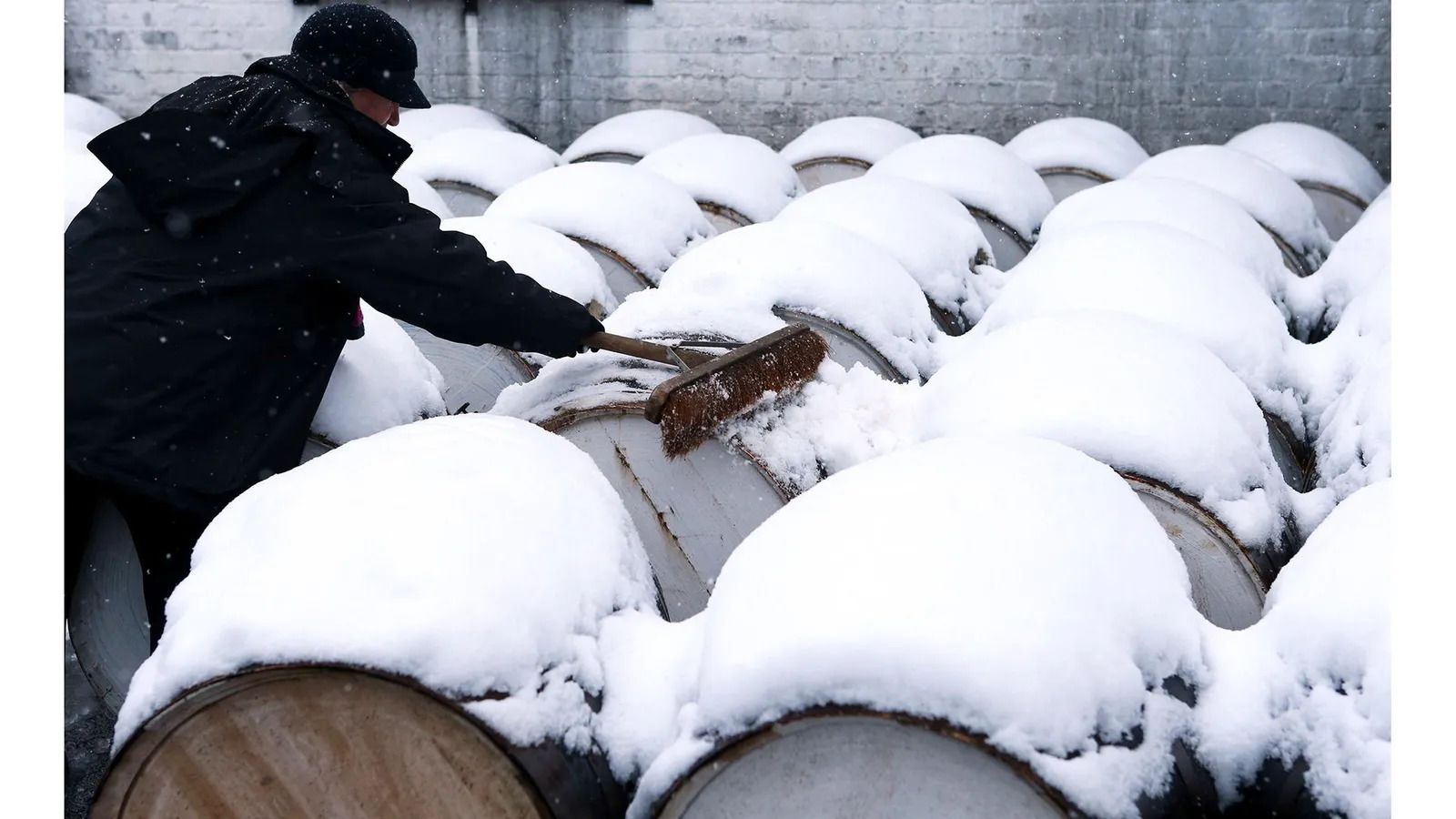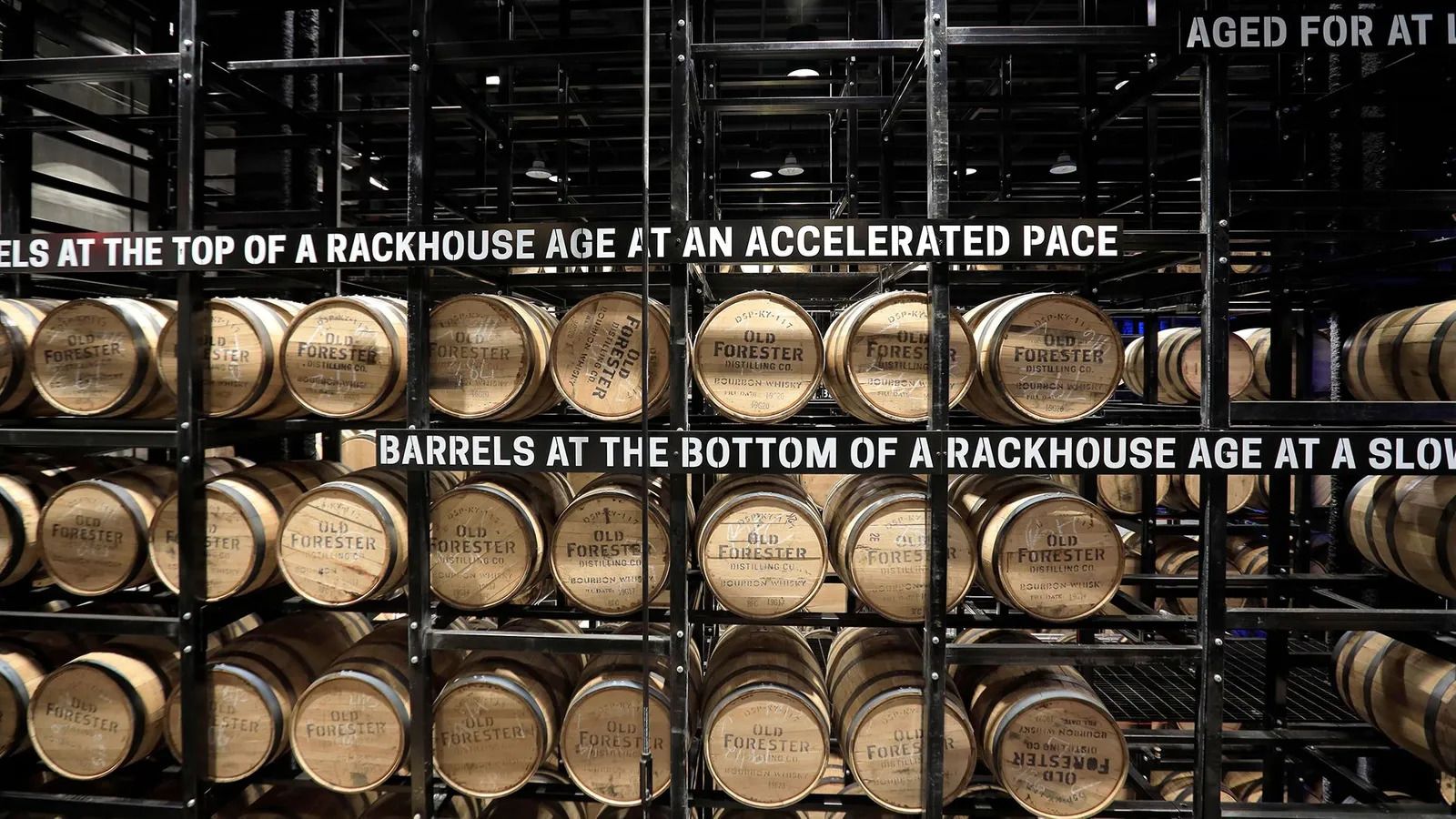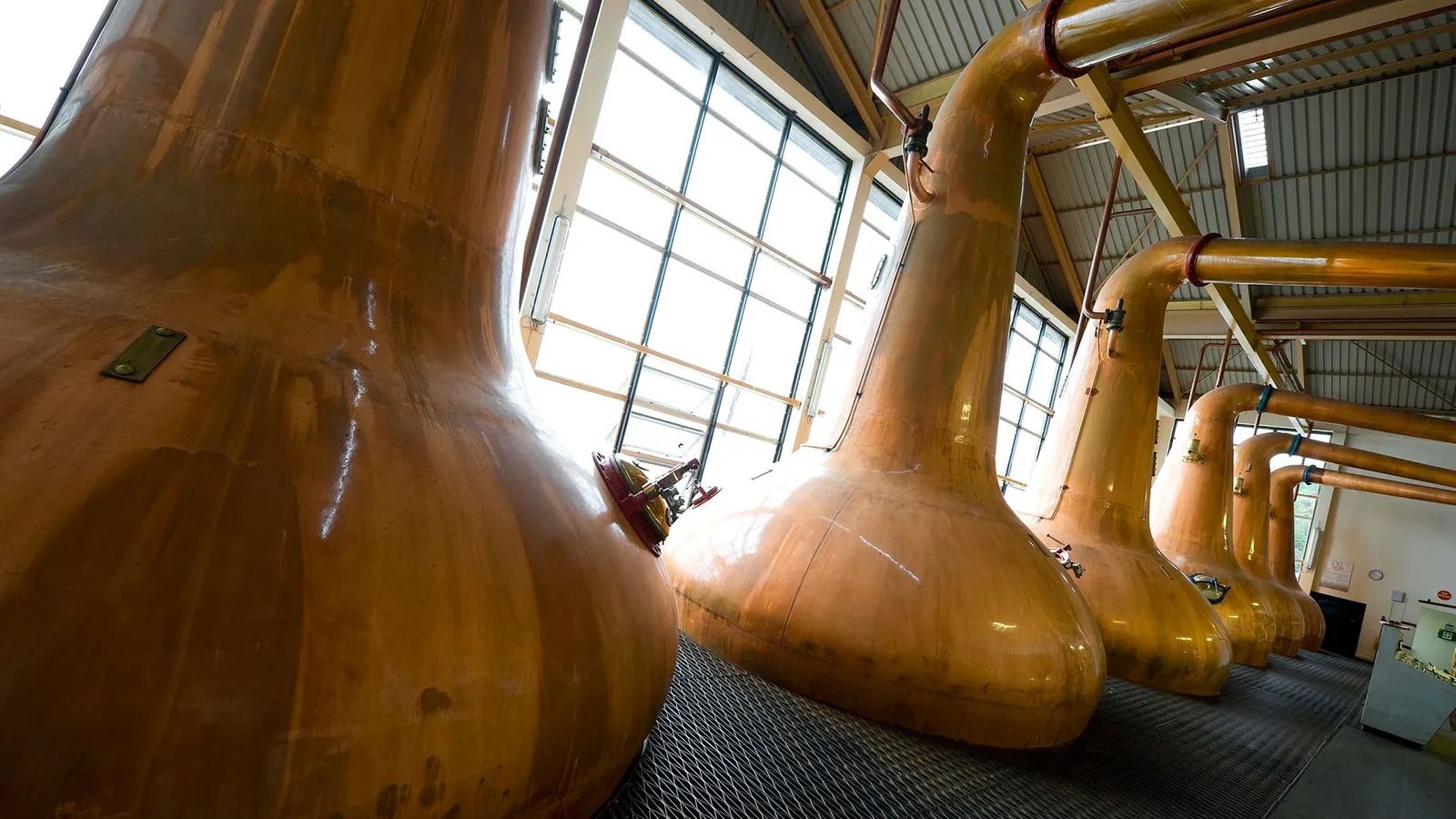
How whiskey is shaped by the weather and climate
The Texan summer is long and hot. This year, particularly so. In some places, people have taken refuge in public libraries just to enjoy the air conditioning. And among those closely tracking the weather, besides overworked meteorologists, is a whiskey distillery in downtown Waco.
Perched on the roof of Balcones Distillery is a complicated bundle of instruments. There's a thermometer, barometer and humidity sensor. One component that measures wind speed spins freely in the breeze. The system can quantify rainfall. Each of the distillery's warehouses at other locations in the state, where the spirit lies maturing in casks for years, also has one of these rooftop weather stations. There are temperature sensors on each floor, too.
"Theoretically, all this information would let us know the best time of year to make a specific kind of spirit and the best place to put it," says Jared Himstedt, head distiller at Balcones. The distillery is relatively young, having been launched in 2008, but has been making a name for itself producing American single malt whiskey and other spirits.
"It's a little bit of really throwing the kitchen sink at the problem and reverse-engineering which barrels turned out the way you wanted," Himstedt says.
He's not sure whether all of the data will prove to be useful in his quest to understand how the unforgiving Texan environment influences distilling and maturation. But he and his team have found that simply tracking temperatures alone has already helped them determine where to place casks in their warehouses in order to encourage the development of certain characters – from light and mellow notes through to richer, spicier profiles.
Higher temperatures can induce a stronger interaction between the spirit and the wood of the cask in which it ages. And tracking temperature is perhaps particularly important in a place like Texas because the difference between the bottom and top of a warehouse, as confirmed by Balcones' data, can actually be quite significant. Conversely, in Scotland, given the country's mild and temperate climate, that within-warehouse difference is far less pronounced.
Whiskey is tied to climate. It ages differently depending on precisely where the casks are laid down – both where in a warehouse, and where in the world. This effect is made obvious by the "angel's share", the volume of whiskey lost to evaporation during ageing. But climate helps to determine how much of the angel's share is alcohol and how much is water, because they evaporate at different rates.
 The cool, damp climate in Scotland means that whisky can be left to mature in casks for decades
The cool, damp climate in Scotland means that whisky can be left to mature in casks for decades
In Kentucky and Texas, the hot and dry climate means that water evaporates more readily than the alcohol, meaning the overall alcohol content (ABV) can often rise. That means these whiskies are only aged for a few years whereas, in Scotland, the cool and humid weather means alcohol evaporates more readily and the ABV falls gradually with age. These whiskies can lie maturing for decades.
However, there are some curiosities, too. Take the Japanese whisky Karuizawa (with “whisky” spelt the Scottish way, as early Japanese whisky followed Scottish traditions). The distillery, now closed, was located at an altitude of 850m (2,789ft) above sea level on the slopes of an active volcano in the Nagano Prefecture of Japan. Despite year-round high humidity and moderate temperatures, the distillers there appear to have achieved elevated evaporation of water from the casks. That meant a higher proportion of alcohol in the final product – typically well over 50% ABV.
Distillers have understood the relationship between storage temperature and alcohol for some time. Whiskey-makers at a Louisville, Kentucky distillery reported in 1942 that oak barrels could be regarded as "exceedingly poor containers" from a storage point of view due to the amount of whiskey that soaks into the wood or evaporates. Imagine opening a cask after months or years of maturation and finding the vast majority of the liquid gone. But since barrel aging is such an integral part of whiskey production, the distillers experimented with lowering the warehouse temperature and found they could reduce this loss drastically.
Fortunately, whiskey makers today have access to more meteorological and climate data than ever before. Many, including the staff at Balcones, want to use it in to improve the quality and consistency of their products. But distillers, like the rest of us, are also having to adapt to climate change. Data could reveal that rising temperatures and extreme weather are affecting their processes.
Environmental fluctuations can matter even on very short timescales. Himstedt explains that his team uses daily barometric readings to decide how to run their stills, the large containers within which spirit evaporates and condenses post-fermentation. It's essential to "cut", or separate, the distillate at the right time, to ensure that you get just the right volume of volatiles and other desirable compounds in the spirit that will go on to be matured in wooden casks.
A crisp, cold September will push more flavour back out as the cask contracts – like squeezing a sponge
If the atmospheric pressure is a little higher than usual, that might mean that the cut point moves later in the distillation process, for instance. Himstedt explains that while this is a subtle adjustment, using the pressure data has achieved more consistent results.
"We're getting more of the days that we really love and a lot less surprises," he says.
Himstedt adds that this year's hot weather could also affect maturation. "It's been over 100F (38C) for I don't know how many days," he notes. That promotes opening of the pores in the cask oak, which draws spirit in, encouraging chemical reactions to take place. Flavour gets imparted as a result of this but the weather that comes next also matters. A crisp, cold September will push more flavour back out as the cask contracts again – like squeezing a sponge, Himstedt says.
That the environment affects these processes is well-known. But there is some debate in the industry over whether varying conditions really yield much of a difference in the final product from year to year, given that these casks lie maturing for long periods, even decades. The impact of one or two hot summers might be undone by successive cooler ones, and so on.
"The number of factors involved in whiskey production in terms of flavour are really mind-boggling," says Kieran Kilcawley, principal research officer in food quality and sensory science at Teagasc, a state agency in the Republic of Ireland.
Even the shape of the neck at
the top of a still, where evaporated liquids rise and then condense, can affect the outcome, he remarks.
Kilcawley and his colleagues have studied how the type of barley used to make whiskey, and where it was grown, produce a noticeable difference in the chemical make-up, and flavour, of the final product. This, they argued in a paper published last year, was evidence for "terroir" in single malt whiskey – the detectable imprint of place of origin in the whiskey's final character and flavour. Most often, the term is used in reference to wine-making.
Whether environmental ups and downs reconfigure the flavour of whiskey at a particular distillery over time, to any great extent, is more of an open question, Kilcawley adds. "It's still very early stages to be able to say, 'definitely'."
 Barrels placed at the top of a warehouse age differently compared to those lower down
Barrels placed at the top of a warehouse age differently compared to those lower down
In Scotland, where the climate is relatively predictable year-round, there may be less of an impact than elsewhere. Rachel Barrie is master blender at the BenRiach Distillery Company. She has pored over weather records for the three distilleries she works with to see whether past heatwaves, cold snaps or very rainy periods have had much noticeable impact on the resulting spirit.
"At the end of the day, I found that the most important thing was the quality of the wood, quality of the ingredients and the distillery character," she says. However, she adds that the climate in other parts of the world will undoubtedly shape whiskey in a way that is unique to the geography in question.
Plus, it may be that places with more variable weather do detect greater differences year-to-year.
"That's the really exciting thing about the new wave of new-world whiskies," says Blair Bowman, whiskey author and consultant. "They're all now having to deal with their own locality."
He mentions the increasingly popular Indian whiskey distilleries as an example. The hot, humid climate where some of these distilleries are located means that their whiskies mature much faster than those in Scotland. This happens thanks to heightened interaction with the cask, and accelerated evaporation of alcohol. Some Indian whiskies might only take around six years to reach a level of maturity that would take more than a decade in Scotland.
But even in Scotland there are distillers keen to channel the vagaries of the local weather into their product in order to exaggerate that effect and bottle it, as it were.
"We kind of work with the seasons as opposed to against the seasons," says Ian Palmer, founder of InchDairnie Distillery in Glenrothes, Fife, Scotland. His stills are not in a building but outside, where the weather has a stronger effect on the fermentation and distillation processes. Palmer chooses a different barley and yeast combination for each season and notes how fermentation, which last roughly 48 hours, might take an additional six hours or so in the winter, when cold air slows the activity of the yeast in the still.
Scotch whisky production will face significant challenges within the next 100 years, according to a report
The result is four seasonal whiskies that are all markedly different, says Palmer. The summer version is lighter and floral whereas the winter one is richer and sweeter, for example. This is largely down to the type of grain, and the kind of cask used for maturation, but Palmer insists that the time of year chosen for production makes a difference, too. Like Himstedt, he is measuring warehouse temperatures to see how that might further influence the whisky as it matures over time.
But if the climate does help to shape the flavour of whiskey, even in nuanced ways, what will the future bring? Climate change is already modifying the character of wine, for example in Bordeaux. Higher temperatures mean that certain grape varieties popular in this region produce more sugar, which in turn fuels fermentation and therefore the production of alcohol. Bordeaux wines used to have ABVs around 12-13%. Today, they tend to be 14-15%.
"I think [climate change] will change the flavour profiles and interactions we see," says Bowman. "I suspect distilleries will be monitoring that a bit closer."
Alarm bells are already ringing in some quarters. Scotch whisky production will face significant challenges within the next 100 years, according to a report commissioned by Glengoyne Distillery and produced last year by researchers at University College London.
The authors note that processes such as fermentation, distillation and maturation in Scotland have been developed over a long period to suit the climate there. However, they add: "Warmer air and water temperatures will lead to inefficient cooling in traditional distilleries and create challenges for conserving the character, consistency, and quality of Scotch whisky."
 Weather conditions such as atmospheric pressure can affect how whisky stills are run
Weather conditions such as atmospheric pressure can affect how whisky stills are run
While some are sceptical that the effect will be pronounced – Barrie says, "We have a very temperate atmosphere and, you know, I don't see that changing" – others are less certain.
Annabel Thomas is founder and chief executive of the net-zero distillery Nc'nean on the west coast of Scotland. In a place like that, the dank, mild climate is a key feature of the location. But it might not remain so.
"If things get really, really hot and we see sustained really high temperatures on the west coast of Scotland," says Thomas, "I think we'd get a different flavour."
In a statement to BBC Future, Ruth Piggin, director of industry sustainability at the Scotch Whisky Association, said future environmental changes do have the potential to affect whisky-making: "Changing rainfall patterns due to climate change can already impact production with suspension of distilling due to low water availability in some areas."
She added that the industry was committed to minimising its own environmental impact.
And in geographies where hot weather is more common, such as India, parts of the United States, or China – a country that is home to many recently opened distilleries – the impact could be even more noticeable.
The truth is that no-one can yet say how much this will hamper whiskey production. And it could lead to some interesting new products. A whiskey that takes merely a year or two to reach levels of maturity previously unthinkable in such a short time, perhaps?
For Himstedt, the prospect of climate change is certainly not a pleasant one. "As things get crazier, more intense, hotter and drier… It's going to be difficult for almost every living thing on the planet," he says.
But he is determined to use data as a defensive weapon. The plan is to find out how the weather and climate affect production today so that he and his colleagues can respond deftly to environmental changes tomorrow. It's know-how that he hopes will help the industry as a whole.
"Things are going to change and hopefully this is some of the groundwork for what the future looks like – that benefits everybody," he says.











